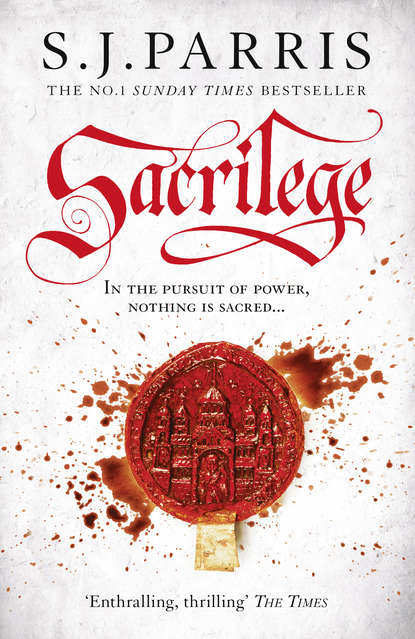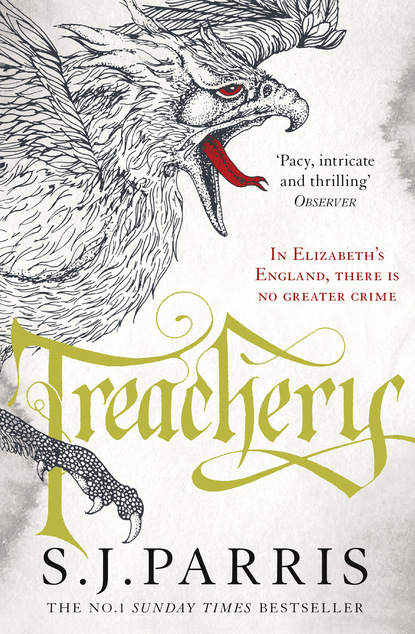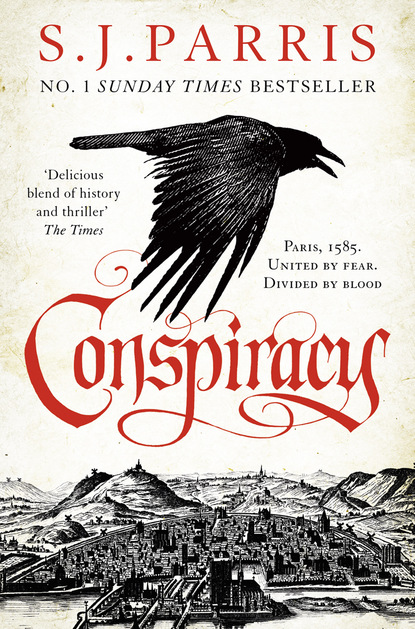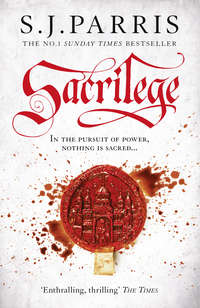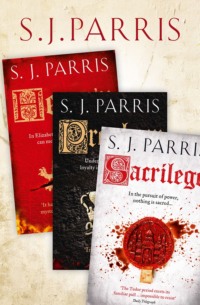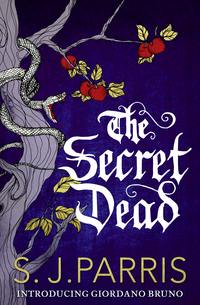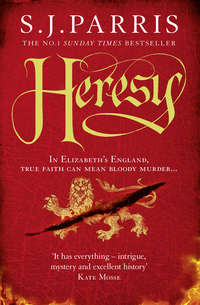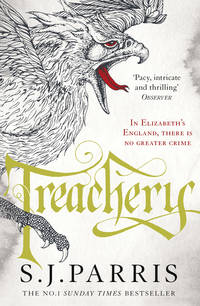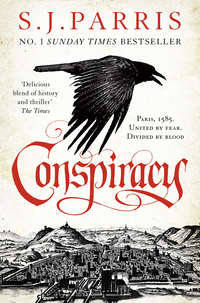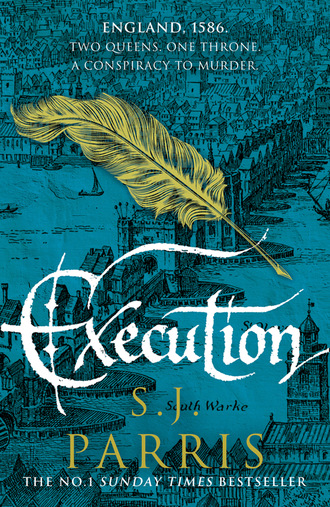
Полная версия
Execution
He did not trouble to disguise his anger. I had the sense that Robin Poole’s antipathy to Anthony Babington had put down roots long before the death of his sister.
‘And the others?’ I prompted.
‘Let’s see. Father John Ballard. Thirty-seven, ordained priest, goes about in the guise of a veteran soldier. Calls himself Captain Fortescue. His faith verges on fanatical. If he’d been born in your country, he’d have volunteered to join the Inquisition, and enjoyed it.’
‘I have met the type,’ I said, with feeling.
‘Ballard dreams of ushering in the reign of a second Bloody Mary, turning the skies over England dark with the smoke of burning Protestants. If anyone could kill a young girl in cold blood, it would be him. Or more likely his faithful dog Jack Savage, who is justly named – he used to be a professional fighter. Then there’s Chidiock Tichborne, Babington’s closest friend – another rich boy who only wants England’s return to Rome so he can get his father’s estate back. Same with Thomas Salisbury – he’s the one Ballard has riding about the country persuading Catholic nobles to let Spanish troops land on their coastline.’ He gave a sceptical laugh. ‘They really think Philip of Spain is going to send his Armada when they snap their fingers. They are all boys playing at holy war.’
‘But they trust you?’
‘I believe they do. I’m from a Catholic family, and Savage vouched for me to Ballard. They think I share their grievances.’
‘But I thought your father worked for Walsingham?’
‘He did.’ A brief pause. ‘He was an informer.’
‘I see. Did the Catholics know?’
‘Well. There’s the question.’ His voice grew tight. ‘My father drowned ten years ago. Fell from the riverbank on the way home one night, they said. Assumed he was drunk. But my father knew how to hold his drink, so …’ He lifted a shoulder, inviting me to draw my own conclusion. ‘I was twenty-two, Clara fourteen, both our mothers dead. Walsingham took her into his house, and paid for me to study the law, so I could monitor my fellow students for him. Now Clara’s gone too, for the same reasons. And I let it happen.’
‘You can’t blame yourself,’ I said, hearing the emptiness of the words before they left my mouth.
‘Not really for you to say,’ he replied, though without rancour.
We crossed the rest of the way in silence as the crowd funnelled through the archway of the Great Stone Gate on the south bank. Poole raised his eyes as we emerged from the shadow and I followed his gaze to the sightless remains of heads on spikes high above. Crows perched on ledges nearby, shreds of matter in their beaks; I looked quickly away.
‘I will see Babington and his fellows up there, whatever the cost,’ he said through his teeth as the traffic eased and we turned right to follow the road along the Bank Side.
SEVEN
I remembered, in an instant, how the first thing that hit you about Southwark was the smell. To be more accurate, the collision of smells, all of them fierce enough to make your eyes water and your throat burn. The heavy scent of hops from the breweries fought with vile stinks from the tanneries and the dyers; these in turn mixed with the human odours of the gong-men’s carts, and the sharp, animal musk of the bull and bear rings as we passed the church of St Mary Overy and the walled gardens of Winchester House. Beyond the bull ring, the famous Bankside Stews lined the road facing the river, with their own ripe scents behind closed doors. According to ancient laws, most of these inns and licensed brothels were painted white, their colourful signs affixed above the doors with images that announced their names to those who could not read: The Boar’s Head, The Horseshoe, The Rose, The Barge, The Half Moon, The White Hart, The Olyphant, The Unicorn. Many were fine old houses with gates wide enough for coaches, and gardens with ponds and orchards stretching out to the rear. But they were separated by narrow alleys running with refuse and ordure, and when Poole turned the horse down one of these to follow it south, away from the river, I pulled the kerchief tighter around my mouth and nose and fought back the bile rising in my throat.
In the streets behind the bank, tenements crowded on one another as if they had been thrown together by drunks from whatever lay to hand: scrofulous plaster flaking from the walls, sheets of oilcloth nailed over windows in place of glass, roofs with missing tiles and greasy boards propping up lean-to shelters barely fit to keep a dog in. Despite the early hour, men in shirtsleeves stumbled along roads rutted by cartwheels, or pissed against the doorposts of alehouses under fading and splintered signs, regarding us with unfocused eyes that made me think of the girl in the stocks. It was impossible to tell if they were on their way home after a long night, or beginning again for a new day. Silent, dirty children with sores around their mouths crouched in the alleys, watching with wary, sunken eyes. Tired-looking women in low bodices and smudged face paint jutted their hips and pouted at us as we passed; one, a spotted scarf around her black hair, made a comical honking noise after us and asked, in a foreign accent, if we handsome gentlemen were hungry for a little gooseflesh this fine morning? When she stepped too close to the horse, causing it to rear its head back, Poole snapped at her to fuck herself. ‘Where would be the profit in that?’ she fired back, quick as blinking, with a merry laugh, and I found myself smiling. Poole muttered something about damned Winchester geese, and I recalled the nickname given to the women who worked in this lawless borough, where any pleasure or entertainment might be acquired, at a price.
Poole turned east and south again, through streets lined with half-derelict buildings, until the tenements gave way to open fields and we followed a mossy wall of crumbling brick on our left. When we reached an unmarked gate, he brought the horse to a halt and sprang down; I followed, and he handed me the reins.
‘This is the place.’ He slapped his palm against the slats. The gate looked as if it could be torn away with one hand, though the lock held fast as the wood juddered. ‘The Cross Bones. They took this from the old keeper.’ He held up a key and fitted it to the lock. ‘Bring the horse in with you, or he’ll be gone in two minutes round here. Nothing but thieves and whores, this whole stinking borough. Let’s see where she was found.’
I followed him through the gap into an uneven patch of waste ground. There were few upright stones; those that remained listed at angles, edges worn away by time and weather, their inscriptions erased to a smooth blank. Here and there rotting wooden posts stood over other mounds, but for the most part you would hardly know the place was given over to the dead, save for its air of neglect and the crows perching with watchful eyes in the trees.
Poole looked about him, scanning the perimeter wall. It stood some ten feet high, though in places the brick was so old and worn it appeared that it would crumble to the touch. To our right, the wall was bordered by a row of cottages in poor repair. Along the side opposite the gate, a few trees remained inside the boundary, branches snaking along the top of the wall, small green apples budding on the higher reaches. Immediately to our left, on a flat patch of earth, an iron brazier stood, flakes of black ash around its feet. I pulled the kerchief down from my face, reasoning that there was no one to see me here.
‘Not what you’d choose for your last resting place, is it?’ He kept his voice determinedly light, though the tightness in his jaw betrayed the emotion he was fighting. ‘A pit of sluts, criminals and suicides. Never thought to see her end up somewhere like this.’ He turned to me. ‘She loved beautiful things, my sister.’
I thought of Clara’s pretty clothes, her careful manicure, that face.
‘At least she won’t be buried here,’ I said, aware it was meagre comfort.
‘She won’t be buried at all till Walsingham gives his say so. She’ll be left to rot till then, and I’m not even told where.’ He clamped his teeth together until he had composed himself. ‘The old watchman swears no one came past him through the gate all night. So they must have come over the wall. There, where the trees are – that’s the only place.’
‘You questioned the man yourself?’
‘No, though I’d have liked to. Walsingham told me. The old boy claims he heard nothing, saw nothing, till he found her under the tree at daybreak. But he’s not necessarily a reliable witness. He’s thought to have a history of turning a blind eye.’
‘To what?’
‘All sorts. It’s said bodies go missing from the Cross Bones. There’s the hospital of St Thomas just upriver – plenty there would pay to get their hands on a fresh corpse. I suppose they think no one would miss a dead whore.’ He gestured to the graveyard. ‘Not as if anyone comes to lay flowers here.’
‘This old watchman digs up the bodies to sell?’
‘Takes a coin to look away while others do it, more likely. If he says he heard nothing, that might be no more than he always says.’
‘He didn’t sell Clara’s body.’
‘He’s not a fool. He’d have seen from her clothes she was no Winchester goose – he probably guessed someone would come looking for her. Don’t suppose that stopped him pocketing what he could first. Come on.’
He set off across the plot towards the far wall. I let the horse loose to graze on the long grass and followed, skirting clumps of nettles and the treacherous dips between graves. Ahead of me, Poole stopped and kicked at a patch of ground beneath the apple tree, scuffing up the earth with the toe of his boot.
‘Look at this,’ he called, gesturing with his foot. I hurried after him, gripped by a sudden horror that he might have stumbled on the girl’s severed ear, tossed aside by the killer. But as I approached I saw what he had found; it was clear no rain had fallen in the past two days, and a wide rust-brown stain spread out between spikes of grass a few feet from the tree. When he lifted his head to look at me, I saw the effort it was costing him to maintain the appearance of detachment.
‘Blood, no?’
I nodded. He bunched one hand slowly into a fist and wrapped it in the palm of the other.
‘They told me she’d been strangled. I thought – well, at least that’s quick, she wouldn’t have suffered too long. So where’s this much blood come from?’
‘She could have wounded her attacker trying to fight him off,’ I suggested, half-heartedly. I recalled how Walsingham had feared Poole’s reaction if he learned what had been done to his sister’s face; I had not anticipated being the one to tell him.
He considered this; I waited for another sarcastic response, but this time he nodded. ‘That would mean she came in alive,’ he said, looking up at the wall.
‘I think you’re right. I can’t see anyone getting a dead body over that. It would take two men at least. But why would she be here at all?’
‘Well, there’s the question. She must have arranged to meet someone.’
He strode away abruptly, tearing at the tall weeds that tangled at the foot of the wall. I watched the ferocity of his movements. So much for keeping his countenance. I reached up and broke a low branch from the tree, sturdy enough to bend back the undergrowth, and swiped back and forth without conviction; I was certain that a killer organised enough to plan such a grotesque display would not have left anything to incriminate himself in the place he wanted the girl found. I wondered again why he would have chosen this spot – neither busy enough to make a public spectacle of the death, nor obscure enough to suggest they wanted to cover it up. It only made sense if my theory about the mutilation was correct, and they were making an allusion to Clara Poole being a whore, and a betrayer. Perhaps I was reading too much into it, and the location was simply convenient, but I found that hard to believe; with a lot less effort her killer could have left her in the street outside. This was Southwark; a body in the gutter was barely cause to break stride for most passers-by.
I pulled myself up into the lower branches of the tree to take a look over at the street, aware of Poole pausing to watch me. Smears of blood had stained the bricks at the top; it looked as if the killer had escaped this way after arranging the body. I was trying to calculate how long the whole business might have taken him, when I glanced down and saw an unmistakable glint of metal through the brambles beneath the tree.
‘Found something?’ Poole asked, straightening and wiping his hands on his breeches.
‘Wait there.’ I shinned down and plunged into the undergrowth to grab the object.
He was almost breathing on my neck when I emerged, hands and arms shredded by thorns and clutching a gold locket, its chain snapped. I held it out to him.
‘Fuck me,’ he said, letting out a slow, shaky breath.
‘Is it hers?’
He nodded, turning it over in his hands. The face was engraved with scrolled letters entwined in a pattern of flowers and leaves.
‘It was her mother’s. She passed it on to Clara when she was dying. Look, here.’ He pressed the catch and the locket sprang open to reveal a curled lock of red-gold hair tucked inside. ‘Clara never took it off. But she wore it under her clothes, in case anyone got close enough to read the inscription.’
He clicked the face shut again and lifted it so that I could see more clearly. Around the edge, the engraved letters spelled out ‘Veritas Temporis Filia’. I raised my eyes and met his.
‘Truth is the daughter of time. But why should that be hidden?’
He seemed pleased by my ignorance. ‘You really don’t know? It was the motto of Mary Tudor, the Queen’s sister, may she burn in Hell.’
‘Bloody Mary? But why did Clara have that?’
‘Ann – Clara’s mother – served in Queen Mary’s household as a young woman. Ann was twenty-five when Mary died, and Elizabeth took the throne. You didn’t go about telling people you’d worked for Bloody Mary after that – you kept your mouth shut and acted like a good Protestant if you didn’t want repercussions. My father forbade Ann ever to speak of it. But she used to tell her stories to Clara, as soon as she was old enough to hear.’
‘So Ann was Catholic too?’ I wondered what effect those old stories might have had on Clara. Could she have harboured secret sympathies for Babington and his friends, despite her debt to Walsingham?
‘Ann worshipped as the law demanded, my father was careful about that. He was taking enough risks with his own double life, he didn’t want his wife doing the same. But Clara said she never gave up her rosary. Nor this locket. Clara wouldn’t have been parted from this lightly.’ His jaw clenched. ‘See here where the chain is broken? Do you suppose he tore it off her if she was resisting him?’
I rubbed the backs of my hands where the thorns had pricked them, glancing to either side with an uneasy sense of being watched. Something didn’t feel right here; I had known that feeling too often not to trust my instincts. It seemed to me that Clara’s locket had jumped too readily to my hand. If the girl’s shoes and sleeves had been stripped from her to sell before her body was handed over, surely a piece of gold jewellery would not have been left behind unless someone wanted it found? We were the only souls in the graveyard, and yet I couldn’t shake the feeling that we were playing on a stage, for the benefit of an unseen spectator. I pulled the kerchief up around my face again, just in case.
‘She could have lost it climbing the wall,’ I suggested, unconvinced.
‘Or – wait – she could have thrown it into the brambles herself,’ he countered, suddenly animated. ‘Suppose she realised what was happening, that her life was in danger? She might have ripped it off and tossed it away to stop him getting his hands on it.’
‘If she was intimate with Babington or one of his friends, they would have known she wore the locket,’ I suggested. ‘Wouldn’t they have searched for it?’
Poole looked at me as if he pitied my stupidity. ‘Babington and his friends were all dining together the night she was killed,’ he said. ‘All save Ballard, who was in France – or so we believe. They didn’t necessarily murder her with their own hands. And if they paid someone to lure her here and get rid of her, he might not have known to look for a locket. Besides, there would have been nothing but moonlight to see by – he couldn’t have lit a lantern for fear of disturbing the old watchman. And if the killer was hurt, he must have wanted to get away as quick as he could. He wouldn’t have wasted time scrabbling through bushes.’
I held my tongue; I could not contradict this thesis without revealing that Clara’s assailant had had the leisure to cut off her hair and ears, and that the blood was not his but hers. It was not for me to take from him the idea of his sister bravely resisting her attacker until her last breath. But the appearance of the locket so conveniently troubled me. Poole was staring at it, rapt, smoothing the pad of his thumb over the surface.
‘Should we keep searching?’
‘What?’ He jerked his head up. ‘Forgive me, I was …’ He indicated the locket with a diffident nod, as if embarrassed by his grief, before slipping it into the pouch at his belt. ‘I suppose we should see if there is anything else.’ But his earlier resolve seemed to have ebbed away; he looked around with the air of a man who has entered a room to find he has no memory of what he came in for. I picked up the broken branch I had discarded and pulled back the undergrowth where I had found the locket, hoping a cursory search would satisfy him so that we could make our way back across the river; there had been no mention of breaking our fast and my stomach was cramping with hunger. As I stepped closer to peer through the leaves, my foot struck something solid. I kicked it back towards me and bent to retrieve an earthenware carafe decorated with the embossed head of a unicorn. I sniffed it; the scent of spiced wine was still strong.
‘What have you there?’ Poole asked, snapping out of his reverie.
I held it up to show him. ‘Only a pitcher. Not been there long, by the looks of it.’ I shook it, to hear the dregs sloshing in the bottom. ‘Perhaps whoever killed Clara brought it with him.’
Poole considered. ‘Or it was thrown over the wall, or the old watchman dumped it. Can’t see that it tells us much.’
I tipped the carafe and let a drop of liquid slide on to my finger. It was a cheap, sweet wine, with a bitter aftertaste beneath the sugar. ‘It comes from the Unicorn, look. We passed that on the way – it’s up the road, on the riverfront. Maybe we should ask there.’
‘Ask what?’ He gave me that same pitying look. ‘Good day, did any of your customers happen to strangle a woman in the Cross Bones the other night?’ He shook his head and I realised he was right. ‘You don’t go around the Bankside stews asking questions like you’re the law, not unless you want to end up in the river. I’ll mention it to Walsingham. It might be something or nothing. I’ll bet these bushes are full of old bottles.’
‘Will you tell him about the locket?’
‘Of course. Though it’s mine by rights, I’m her only family.’ His hand moved protectively to the pouch where he had stowed it. I waited, hoping he would decide it was time to go, when a movement at the edge of my vision made me spin around to see a slight figure crouching on the wall across the graveyard, above the gate.
Poole followed my gaze and gave a shout; the intruder straightened, pausing long enough for me to see that it was a boy of about ten, dressed in a ragged cap and breeches. His skin was darker than usual for an English child; he would not have looked out of place on the streets of Naples.
‘You there – stay where you are!’ Poole yelled. The boy instantly disappeared, dropping to the far side of the wall silent as a cat. Poole swore and set off at a run across the grass towards the gate, hampered by his damaged leg. ‘Cut the little fucker off the other side,’ he called to me over his shoulder, pointing at the tree. I launched myself up through the branches and over the wall to the street, landing hard and narrowly missing a pile of horseshit. Cursing, I ran the length of the street towards the row of cottages, but there was no sign of the boy to left or right when I reached the end. A couple of minutes later, Poole rounded the opposite corner, slowing when he saw me. I shook my head; the child could have slipped into any number of hiding places, or simply outrun us.
‘How long was he watching?’ Poole breathed hard, his face rigid with anger.
‘No idea. I saw him a moment before you did.’ But I remember the cold sensation of being watched earlier; had the boy been there all along?
‘I want to know his business.’ He bunched his fists. I was surprised by his anger.
‘We’re not likely to find him now. He was probably just a street boy being nosy.’
‘That’s what I’m worried about. Why would he be watching the Cross Bones?’
‘You think he was spying? For whom?’
Poole rolled his eyes. ‘I wonder that Master Secretary sets such store by your wits,’ he said, and I did not miss the barb in his tone. I realised then that he resented me – and that could only mean Walsingham had spoken highly enough of me for Poole to fear I threatened his standing. I confess that the thought pleased me. ‘No one is supposed to know that Clara is dead, least of all me,’ he continued, his voice a low growl. ‘Coaxing a slip-up from Babington and his friends depends on me pretending I know nothing of her whereabouts. If I have been seen poking about the scene of her murder, my deception will be exposed.’
‘Exactly as Phelippes warned,’ I murmured. He shot me a hostile glare.
‘He saw you too.’
I refrained from reminding him that Phelippes had foreseen that as well.
‘We’re not going to find the boy now. The best thing we can do is get away from here as quickly as possible. It’s probably nothing,’ I added as we retraced his steps past the cottages. ‘Maybe he just took a fancy to the horse. You said yourself the whole borough is full of thieves.’
Poole stopped dead and stared at me. ‘Shit. The gate.’
He broke into a run; I followed him around the corner and we tumbled through the open door of the Cross Bones, to find the graveyard empty. Only a fresh pile of dung by the brazier gave any indication that a horse had ever been there. Poole tore off his hat and flung it on the ground with an impressive string of oaths that would have made a Neapolitan proud. When he had exhausted all the words he knew, he looked at me.
‘Are you laughing?’
‘Sorry,’ I said, leaning against the wall and clutching my stomach. I could not even say why I found the situation so funny; the two of us, vying with each other for Walsingham’s approbation as to who was the best of his espials, while a child thief had played us like a lute. Poole took a step forward and I shrank against the wall, bracing myself to dodge a punch, but he stopped abruptly and doubled over, his shoulders shaking. Eventually I realised he was laughing too.
‘Oh, fuck,’ he said, when he could speak, straightening up and wiping his eyes. ‘It wasn’t even my horse. It was Ballard’s. He’ll have my balls.’ He laid a hand on my shoulder and burst into guffaws again. I clapped him on the back. I could see that this was a way for him to release the pent-up emotion of the past hour, and it seemed to have broken the tension between us too. But I couldn’t help a glance behind me. Perhaps the boy was a mere horse thief, but he had seen my face.
EIGHT
We caught a wherry back across the river from Goat Stairs and walked back up through the city to Leadenhall. I bought a pie from a street vendor on the way, though Poole ate nothing; his fit of hilarity had passed in the boat and a morose mood had overtaken him. I wondered if he was brooding on his sister or the loss of the horse.
Back at Phelippes’s rooms, we found Walsingham prowling the large study like one of the Queen’s caged beasts, while his cryptographer sat in his usual place at the desk, head bowed, quill scratching.


